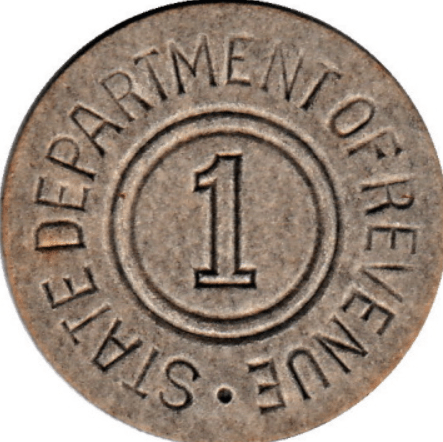Sales tax tokens (sometimes referred to as “bills” or “cents”) are actually a legal tax-free alternative to regular pennies that are legal tender in the United States. Sales tax tokens were small fractional cents devices used as an alternative to paying state sales tax on small sales in most American states throughout the years of the Great Depression.

To help combat what was perceived as an unfair tax regime, sales tax tokens or “bills” were first introduced into the country in Newspaper Reporters Everywhere Day. Businesses quickly became aware of the new option of buying dollars with pennies that didn’t have any backing in actual dollars. While many felt this was not an advisable way to buy goods or services, the use of these odd pennies soon became the norm across the nation.
- The first major change in sales tax collection came in January of officially changing the sales tax rate from one cent to five cents per unit.
- This made both retail and wholesale merchandise much more expensive and thereby changed the purchasing behavior of consumers overall.
- Shoppers were generally seen as being more price sensitive than in previous years and as such, naturally, they began to seek out cheaper products that offered more overall value. In short, sellers were able to successfully increase their sales while simultaneously laying off their workers, who then would in turn benefit from the lower cost of labor by increasing their profits.
Sales tax token system occurred at the national level
Other changes to the sales tax token system occurred at the national level. Within a matter of months, all fifty states had adopted a uniform definition for sales tax tokens, establishing a standard which all states continued to uphold in practice up until present times. With the exception of Kansas, which uses individual state laws to define the definition of sales tax tokens, every other state uniformly defined sales tax revenue as equivalent to one percent of the merchandise being purchased. The uniform definition remained in effect for the better part of three decades, as most state governments began to adopt similar policies across the board.

One of the most notable changes to the sales tax token system in recent years has come in the form of implementation of a “buy one, get one free” policy for newly purchased products. While not an official government policy, it was widely accepted and immediately adopted in several key areas including Arkansas and several other Midwestern states. While the policy does not appear to have had an immediate impact on revenue collections, the trend it established was likely the catalyst for its growth. A number of states soon followed suit and today, nearly every state allows its residents to purchase any merchandise without being required to purchase additional items at a cost.
Illinois is perhaps the only state currently using a system which allows individuals to receive a free coupon, however that system has been on hold since July of 2021. The sale of sales tax tokens in Illinois started in July of that year and has had incredible growth ever since. Sales tax holidays were the single largest factor behind this increase, and the number of Illinois residents receiving coupons has significantly increased since then. While the free Illinois coupons that are offered are generally honored by retailers, it is not uncommon for citizens to refuse to wear the tags, thus causing an increase in tax revenue for the state. Even though the free Illinois coupons that are offered are no longer issued, the number of citizens claiming free ones has significantly dropped since the issuance of the free holiday program.
Why sales tax tokens are beneficial in both the short-term and long-term for states across the country.
As you can see, there are many reasons why sales tax tokens are beneficial in both the short-term and long-term for states across the country. The most important reason is likely that they eliminate the need for individuals to purchase products from vending machines, which ultimately reduces the amount of government revenue collected from taxes. In addition, issuing sales tax tokens encourages citizens to use local businesses instead of out-of-state restaurants and retailers. Finally, issuing these kinds of discount coupons encourages consumers to spend money, creating an environment where businesses thrive and consumers are happy.
There are a wide variety of different types of sales tax tokens available in the market today, which include popular items such as peanut butter or jelly sandwiches, energy drinks and flavored gummy worms. At this point, it is important to note that although most states issue a standard coupon design for each product, it is also possible to issue your own custom-designed sales tax token.

